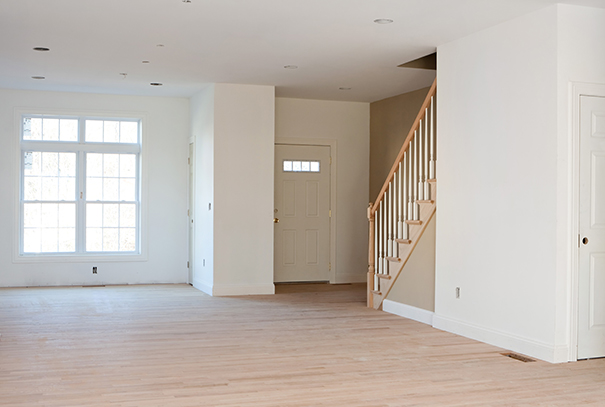An analysis of the most pressing concerns based on insights from 1,000 UK business leaders.

The wide-ranging risks associated with empty properties are growing in importance, especially with over 479,000 vacant properties reported in England alone1. A whole host of problems2 can occur when it comes to vacant homes, from malicious damage such as vandalism to structural damage, including fire or water damage. With this in mind, when it comes to home insurance the importance of tailored cover to suit unique circumstances is key.
Why consider unoccupied property insurance
Consideration should be given to how to keep a property safe, as well as prepare for possible return or sale. Significantly, insurers can consider an empty home to be high risk, particularly, if they became aware that a property had been left empty without the appropriate cover. It could mean than any existing home insurance policy may be restricted in terms of the protection offered. If a home is left empty, the insurer should be informed and specialist cover put in place to help protect it, so that the additional risks can be reduced. Insurers may specify certain requirements in order to provide sufficient cover.
An empty home can be regarded as vulnerable and could be exposed to unexpected incidences especially where there is a delay in its discovery. The property could be vulnerable to severe weather issues or water damage due to burst pipes and other maintenance related issues, such as gas leak or electrical fire or be at greater risk of theft and criminal damage caused by vandalism.
Top priorities to consider for an empty property
Minimise the risk of water damage
Escape of water is one of the most common issues with unoccupied properties. It may be prudent to:
- Turn off the water supply at the mains or drain down water systems
- Arrange for the temperature to be kept to a minimum 10⁰C
- Ensure any items left in the building that could be at risk of water damage are removed or raised off the ground
Carry out regular inspections and protect against criminal activity
- Check and secure all entry points to the property
- Carry out regular inspections and reduce any obvious signs that the building is empty, remove any build-up of waste or post
- Check that the alarm and security systems are still in working order
Reduce the threat of fire
- Turn off and unplug electrical equipment, and arrange for electrical systems to be isolated at the main fuse board
- Close all internal doors to diminish the likelihood of fire spreading
- Reduce the risk of gas leaks by disconnecting supply from source
- Ensure any alarm available is activated and fire extinguishers are in place
It is important that you do all you reasonably can to protect your property. Every property will have different security requirements, however implementing and evidencing these measures can help you secure your property, discourage criminal activity and reduce the risk of damage.
Protect what matters to you
Many standard property insurance policies may not provide cover for when a property is unoccupied for more than 30 days, or sometimes less. Look for cover that comes with a whole host of unique features and covers as standard, coupled with an experienced customer service team on hand to help at every stage of the process.
If you would like to discuss in more detail how to protect your property or properties or have any questions related to your property please get in touch. We can help ensure you have adequate cover in place.
Get in touch
If you need specialist home insurance cover, or would like a review of your existing arrangements, please get in touch.
Contact: Non-Standard Home Insurance Team
Call: 0345 000 0438
- England/Revised data February 2021
Ministry of Housing, Communities and Local Government: Council Taxbase 2020 in England - GOV.UK (www.gov.uk)
Table 3: number of dwellings classed as empty by level of discount and premium awarded, 2016 to 2020 - https://www.capacitygrid.com/2021/02/02/councils-must-tackle-the-financial-challenge-of-empty-homes-before-its-too-late/
The sole purpose of this article is to provide guidance on the issues covered. This article is not intended to give legal advice, and, accordingly, it should not be relied upon. It should not be regarded as a comprehensive statement of the law and/or market practice in this area. We make no claims as to the completeness or accuracy of the information contained herein or in the links which were live at the date of publication. You should not act upon (or should refrain from acting upon) information in this publication without first seeking specific legal and/or specialist advice. Arthur J. Gallagher Insurance Brokers Limited accepts no liability for any inaccuracy, omission or mistake in this publication, nor will we be responsible for any loss which may be suffered as a result of any person relying on the information contained herein.
Arthur J. Gallagher Insurance Brokers Limited is authorised and regulated by the Financial Conduct Authority. Registered Office: Spectrum Building, 7th Floor, 55 Blythswood Street, Glasgow, G2 7AT. Registered in Scotland. Company Number: SC108909. ajg.com/uk


